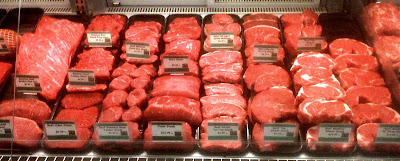 |
| Eating meat could affect your heart health. Image: Shutterstock |
When it comes to ischemic heart disease, two of the main risk factors are high blood pressure and
high cholesterol. Saturated fat is the biggest dietary factor that
contributes to the production of cholesterol. As for sodium, it’s the biggest
dietary determinant of high blood pressure, according to Dr. Peter McCullough, cardiologist for St. John Providence Health System.
 |
| Vegetarian diets had a lower risk of heart disease. Image: Shutterstock |
Of course, one doesn’t necessarily need to become a
vegetarian to cut saturated fat and sodium from their diets. It certainly makes
it easier, but vegetarianism can also come with problems like not getting
enough protein and consuming too many sugars. Cheese, which vegetarians tend to
consume in larger amounts, is also a big source of saturated fat.
 |
| Image from acanaturalmeats.com Beef is the unhealthiest source of protein. |
Being choosy about meat products can go a long way in
lowering the chance of heart disease. Fish is the healthiest source of protein,
followed by beans and nuts. The least healthy source of protein is beef, since
it’s usually quite fatty. McCullough recommends staying away from the “three
s-es:” sugars, starches, and saturated fats to lower health risks.
I generally eat about half my main courses vegetarian and
the other half with a serving of meat. Do you eat meat, or are you a
vegetarian? I’d love to hear your input in the comments below!
No comments:
Post a Comment